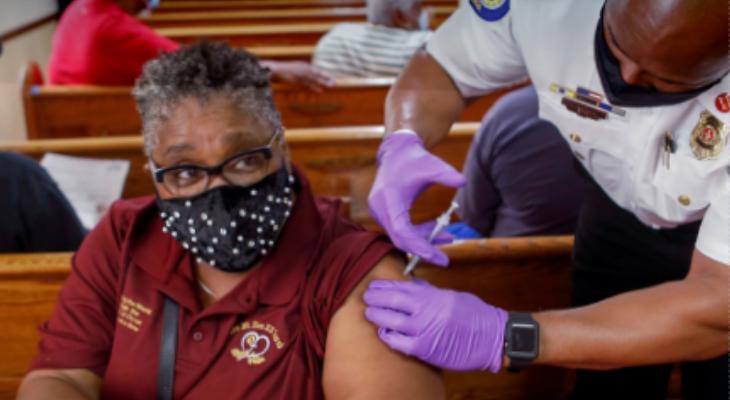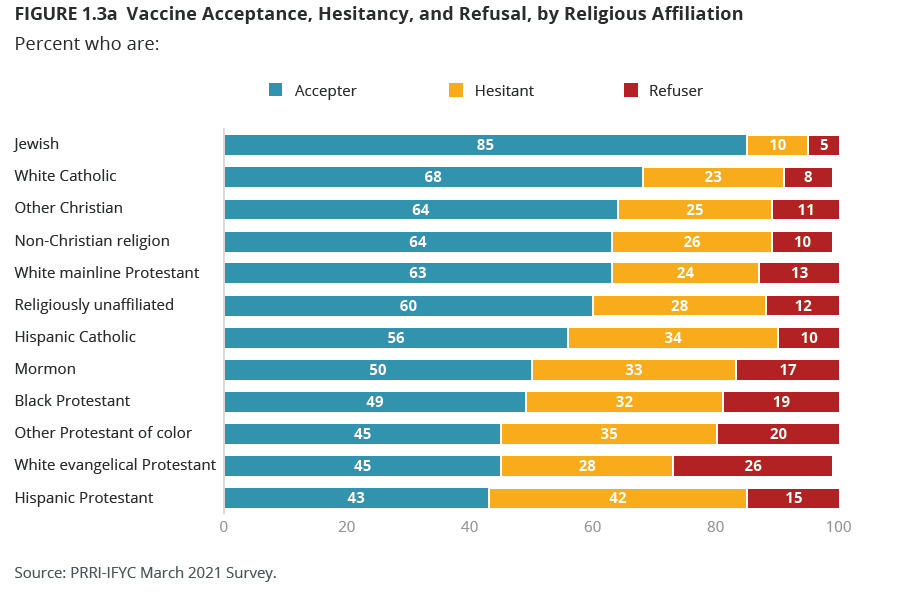Survey: Faith-Based Approaches Supporting Vaccinations Likely to Move Vaccine-Hesitant Americans Toward Acceptance
April 22, 2021

As COVID-19 cases begin to rise again across the nation, and vaccines become widely available, the challenge ahead is getting the population to get vaccinated. A new survey conducted by the Public Religion Research Institute (PRRI) and Interfaith Youth Core (IFYC) found that faith-based approaches can move many vaccine-hesitant communities toward acceptance.
“Religious engagement could be the key to herd immunity,” said IFYC founder and president Eboo Patel. “A significant part of the American population is telling us that one or more religious messages can move them from vaccine hesitancy, and even outright refusal, to acceptance. As we approach the long last mile, the strategy has to include ramping up collaborations between government officials, public health leaders, and trusted messengers within racially diverse religious communities working together to increase confidence in the vaccine and get shots in arms.”
The survey is the largest research on religion and COVID-19 to date. The poll reached out to 5,600 Americans from March 8-30, 2021, seeking to understand the relationship between religious identity and vaccine acceptance, as well as learning if a faith-based approach in favor of vaccinations could be an effective tool.
“Religion is a critical but often overlooked factor both for understanding the complexities of vaccine hesitancy and for developing strategies for winning the battle to overcome COVID-19 and its future variants,” said PRRI founder and CEO Robert P. Jones. “For example, among Black Protestants, attending religious services is associated with lower levels of vaccine hesitancy, while the opposite is true among white evangelical Protestants, where clergy have been more reticent to speak out. In both settings, faith-based approaches have the potential to be very effective in improving vaccination rates among both groups.”
Substantial majorities of every religious group surveyed are at least somewhat confident that the needs of religious people are being considered in vaccine distribution. Around seven in ten Hispanic Catholics (72%), other Christians (71%), religiously unaffiliated Americans (71%), white evangelical Protestants (68%), and other Protestants of color (68%) are confident that the needs of religious people are being taken into account. Black Protestants (62%) and Hispanic Protestants (59%) are the least likely to be confident that the needs of religious people are being taken into account.
The survey found that more than one-quarter of Americans (26%) who are hesitant to get a COVID-19 vaccine, and nearly one in ten (8%) of those who are resistant to getting a vaccine, say that at least one of six faith-based approaches supporting vaccinations would make them more likely to get vaccinated. Among those who attend religious services at least a few times per year, 44% of those who are hesitant and 14% of those who are resistant say faith-based approaches would make them more likely to get vaccinated.
U.S. Religious Groups and Vaccine Hesitancy
Vaccination efforts slowly rolled out across the U.S. in January 2021, and as of the end of March, more than half of Americans (58%) reported they had gotten a COVID-19 vaccine or would get vaccinated as soon as possible. On the other hand, nearly three in ten Americans (28%) report that they are hesitant to get vaccinated, including 19% who say they will wait and see how the vaccines are working for others and 9% who will only get vaccinated if required to for work, school, or other activities. 14% of Americans shared they will refuse to get a vaccine.
Among these hesitant or resistant Americans, there are clear divisions by religious affiliation.
Share
Related Articles
American Civic Life
Faith Based Efforts Work in Vaccine Uptake: Now Let’s Make it Easy
American Civic Life
American Civic Life

Jewish Americans (85%) are by far the most likely to be vaccine acceptors, to have received a vaccine, or to say they will get vaccinated as soon as possible, while more than two-thirds of white Catholics (68%) are vaccine acceptors, as are 64% of other Christians, 63% of white mainline Protestants, and 63% of other non-Christian religious Americans.
Among the religious groups least receptive to the vaccines, white evangelical Protestants stand out as the most likely to say they will refuse to get vaccinated (26%), with an additional 28% who are hesitant.
The survey also found that the frequency of church attendance has different impacts on vaccine acceptance across different religious groups. More frequent church attendance is correlated with a lower likelihood of vaccine hesitancy among white mainline Protestants and Black Protestants, but it is associated with higher vaccine hesitancy among white evangelical Protestants. By contrast, white evangelical Protestants who more frequently attend religious services are more likely than those who seldom or never attend to be vaccine-hesitant (31% vs. 24%), although they are not more likely to be vaccine refusers (26% vs. 27%).

Other Notable Findings:
IFYC is using the findings of the report to inform the work they are doing across the nation including mobilizing thousands of young people as Faith Ambassadors to help people have honest discussions about vaccines and promote vaccination acceptance, even in the most resistant communities.



